 Top
Who is OKADA?
Mind and Brain
Salon
Academic Activities
Teaching
Social Service
Publications
Career
Top
Who is OKADA?
Mind and Brain
Salon
Academic Activities
Teaching
Social Service
Publications
Career
 Top
Who is OKADA?
Mind and Brain
Salon
Academic Activities
Teaching
Social Service
Publications
Career
Top
Who is OKADA?
Mind and Brain
Salon
Academic Activities
Teaching
Social Service
Publications
Career
Thank you very much for visiting Naoyuki OKADA's website. This page gives his profile.
Doctor of Engineering, University of Kyushu
Professor Emeritus, Kyushu Institute of Technology
Fellow, Japan Federation of Engineering Societies,
Institute of Electronics, Information, and Communication Engineers, and
Information Processing Society
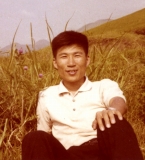 1965- Through the detailed semantic analyses of Japanese vocabulary, he made clear the primitives of human thought from the linguistic viewpoint, taking initiatives in stirring up the development of semantic dictionaries for computer processing in japan.
1965- Through the detailed semantic analyses of Japanese vocabulary, he made clear the primitives of human thought from the linguistic viewpoint, taking initiatives in stirring up the development of semantic dictionaries for computer processing in japan.
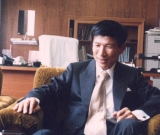 1970- He proposed to make different kinds of media, or language and images, associate each other through their common meanings, being a global pioneer in constructing a system for natural language description of moving picture patterns.
1970- He proposed to make different kinds of media, or language and images, associate each other through their common meanings, being a global pioneer in constructing a system for natural language description of moving picture patterns.
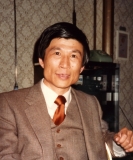 1980- He stressed the importance of emotional processing in AI in the era when most researchers are interested only in knowledge processing because of the difficulty of computation of emotion, and attacked the construction of an integrated agent with both intellect and emotion.
1980- He stressed the importance of emotional processing in AI in the era when most researchers are interested only in knowledge processing because of the difficulty of computation of emotion, and attacked the construction of an integrated agent with both intellect and emotion.
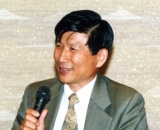 1990- The human mind is so complicated and diverse that it is not easy to show its framework. He showed a computer model of the mind from both its functions and abstraction-levels, leading the development of integrated AI systems at home and abroad.
1990- The human mind is so complicated and diverse that it is not easy to show its framework. He showed a computer model of the mind from both its functions and abstraction-levels, leading the development of integrated AI systems at home and abroad.
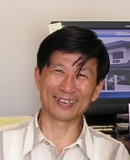 2000- The behavior of the mind to which all the nature comes is supported by common sense. What kind of category and how many primitives of common sense do we have? He clarified that the system of common sense is composed of several thousand basic concepts, producing complex or interconnected ones by rules.
2000- The behavior of the mind to which all the nature comes is supported by common sense. What kind of category and how many primitives of common sense do we have? He clarified that the system of common sense is composed of several thousand basic concepts, producing complex or interconnected ones by rules.
2010-Present The system of the mind is abstract, but it finally grounds on the brain where thousands of signals are exchanged on the neuron network. It is not clear how the abstract mind grounds on the brain, or concrete substance. If the grounding process can be made clear, then the essential difference between human and artificial intelligence will be
clarified, too. This is his current theme.
For the above-mentioned research work, Dr. Marvin Minsky or the father of AI sent him a message as follows:
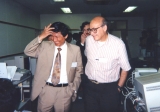 For many years I have shown my students his work so that they can see some models of mind in which different realms of abilities are combined. For even today, it still is rare to find researchers who can integrate several different kinds of techniques. Eventually all AI machines will do such things, now that Naoyuki Okada has shown us how. And I hope that with his retirement, we will able to see more of him.......Marvin Minsky, March 7, 2003.
For many years I have shown my students his work so that they can see some models of mind in which different realms of abilities are combined. For even today, it still is rare to find researchers who can integrate several different kinds of techniques. Eventually all AI machines will do such things, now that Naoyuki Okada has shown us how. And I hope that with his retirement, we will able to see more of him.......Marvin Minsky, March 7, 2003.
Marvin Minsky,@Professor Emeritus, Massachusetts Institute of Technology, USA
* It is a great pity that DR. Minsky died in January, 2017. Naoyuki Okada expresses his condolences for the death of Dr. Minsky.
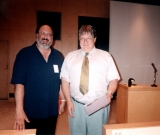 Yorick Wilks, Professor Emeritus, University of Oxford
Yorick Wilks, Professor Emeritus, University of Oxford
Nick Cercone,@Professor Emeritus, York University, Canada
* It is a great pity that DR. Cercone died in December, 2016. Naoyuki Okada expresses his condolences for the death of Dr. Cercone.
In addition to the formal side mentioned above, he has another, more familiar side.
Travel: He went abroad many times including three around-the-world trips. The memories of European cultural heritages succeeded for ages, American vast landscapes created by great nature, or Oceanian seasonal changes opposite to the Northern Hemispherefs and the friendly relations established there are his treasures.
Seeing paintings: He has visited the major museums of the world, e.g. Louvre, Orsay, British, Prado, Uffizi, Metropolitan, Boston, and so on, especially enjoying Impressionism or Cubism such as Cezanne or Picasso.
Listening to music: He likes jazz music, particularly modern and dixieland jazz. gSoftly as in a morning sunriseh by Modern Jazz Quartet is one of his favorite tunes.
 Watching motor sports: MotoGP, World Superbikes, IndyCar, Formula 1 and so on. He loves the eardrum-break sound ejected from the exhaust pipes of high-power engines.
Watching motor sports: MotoGP, World Superbikes, IndyCar, Formula 1 and so on. He loves the eardrum-break sound ejected from the exhaust pipes of high-power engines.
Driving cars: He has left the traces of tires of his cars here and there in Japan. His cars started with Blue-bird SSS with twin carburetors by Nissan in 1960s, and were bettered gradually. The sixth car had evolved to Eunos-Cosmo with three rotary engines by Mazda. The engines are so powerful and silent that the driver is comfortable on highways or even unpaved roads. It was the first generation car equipped with GPS. Since he gets old a little bit, though his mind is still young, he enjoys a popular car, Toyota Prius now. It is an older man's pleasure slightly different from the young men's, say, to achieve a green screen of the display, that is, full-charge of the battery during a grand tour.
Top
Who is OKADA?
Mind and Brain
Salon
Academic Activities
Teaching
Social Service
Publications
Career

Copyright (c) 2018 Naoyuki Okada. All rights reserved.